Creation Care
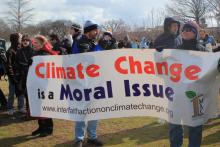
God’s creation is in danger; and to call upon the powers of the world to heal it, God’s people are prepared to go to jail.
Perhaps most famously in our recent history, the startling sight of a religious leader in jail was embodied in the willingness of Dr. Martin Luther King, Jr., to go to jail more than 20 times in order to embody his religious commitment to racial justice, peace, and nonviolence.
As we approach the Holy Week of Christianity and Passover, we should be aware that this tradition goes back thousands of years. The movement of ancient Israelites seeking freedom from a lethal Pharaoh began even before Moses, when two midwives – the Bible carefully records their names, Shifra and Puah – refused to murder the boy-babies of the Israelites as Pharaoh had commanded. The recollection of that moment is the first recorded instance of nonviolent civil disobedience.
When that cruel and arrogant Pharaoh, addicted to his own power, refused freedom to his nation’s slaves, his arrogance forced the Earth itself to arise in what we call the Plagues – ecological disasters like undrinkable water, swarms of frogs and locusts, the climate calamity of unprecedented hailstorms.
Passover has kept alive and lively the memory of that uprising. So it is not surprising that the Gospels record that just before the week of Passover, Jesus led a protest against the behavior of the Roman Empire, its local authorities, and a Temple he and his followers thought had become corrupted from its sacred purpose.
To protest against the Empire of his era, Jesus chose a time that was both appropriate and dangerous, since Passover celebrates the fall of Pharaoh. His challenge resulted in his arrest and imprisonment, and then his torture and execution.
Both Judaism and Christianity can trace their origins to acts of nonviolent civil disobedience. Indeed, for several centuries of Imperial Rome, the very persistence of Rabbinic Judaism and Christianity were collective acts of civil disobedience.
Today, religious folk face modern plagues imposed upon our countries and our planet by a new kind of Pharaoh.
OVER THE PAST few years, we have seen tangible proof that creation is terribly off balance. Global warming is causing droughts and heat waves around the world and is making hurricanes more powerful. In my hometown of New York City, we have experienced the effects of severe weather: Hurricane Irene in 2011 and, most recently, the devastation of Hurricane Sandy. Sandy was an eye-opening demonstration that climate change is a poverty issue, a race issue, and an immigration issue.
Though neighborhoods of all socioeconomic statuses were affected by Sandy, poorer communities are taking longer to recover. Many of them were without electricity, heat, and water longer than were more affluent communities. For instance, residents of Red Hook's public housing projects in Brooklyn were without power and water for two weeks after the storm. My cousin Dabriah Alston, a Red Hook resident, told me that the city ignored residents' repeated requests for information about when the heat would come back on: "The bottom line is, they don't care about us. Projects are filled with poor folk, and as we all know, the poor are seldom a priority."
Hurricane Sandy shone an uncomfortable light on racial and economic disparity in New York City. As someone who was born and raised in Brooklyn, I am very familiar with Red Hook's history of poverty, and the neglect by local government. For example, only when the community near the housing projects began to gentrify did the city start to repair the nearby subway station.
Sandy also exposed how, in the city that is home to Ellis Island, immigrants live in an environment of fear. Although families of mixed immigration status qualify for some FEMA disaster assistance, and families of any status qualify for emergency food aid, many did not apply for it because they feared deportation, as I learned at a post-Sandy meeting of the Occupy Faith group. The environment of fear magnified the impact that the hurricane had already had on the poor: Many immigrants are non-salaried workers who missed a week of their already-low wages due to the hurricane.

The day after the Washington Post announced it was moving its top environmental reporter off the green beat to cover politics at the White House, this op-ed went up toeing an uncomfortably familiar line: by speaking out against the Keystone XL pipeline, environmentalists are “missing the climate-endangered forest for the trees.”
Leaving aside for a moment the uncomfortable irony of being reprimanded for missing the big fight by an outlet that is reshuffling focus on that very front: the editorial board, respectfully, is wrong. Not that it doesn’t have a point, but that point is concrete and incremental – and misses the entire meaning of the forest of protests over the last 18 months.
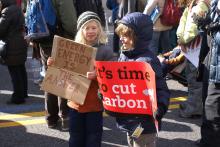
This past Sunday an estimated 35,000 people gathered in Washington, D.C., to push for legislative action in response to climate change. In addition to speaking out against the proposed Keystone XL pipeline, the “Forward on Climate” rally organizers urged President Barack Obama to limit U.S. greenhouse gas emissions and transition to larger levels of renewable energy. In addition to the mass assembly near the White House, environmental groups held similar rallies in cities across the nation, including a significant turnout in Los Angeles. All together, some have described the events of the past weekend as the largest collection of climate change rallies in U.S. history.
The president has recently emerged as a potentially strong ally in the struggle against climate change, for his inaugural address included a renewed commitment to environmental leadership, as he stated: "We will respond to the threat of climate change knowing that the failure to do so would betray our children and future generations.”
President Obama also addressed ecological concerns during his State of the Union speech, as he said: “We can choose to believe that Superstorm Sandy, and the most severe drought in decades, and the worst wildfires some states have ever seen were all just a freak coincidence. Or we can choose to believe in the overwhelming judgment of science – and act before it's too late." While conversation surrounding climate change was notably absent during his recent re-election campaign, the president appears to be making environmental concerns a top priority for his second term of office.
While President Obama seems to be a more visible environmental advocate, many are doubtful of his sincerity and question whether such statements are motivated by political calculation rather than genuine policy priorities. For example, in what can be described as a thought-provoking twist of irony, while thousands marched past the White House to move the president “Forward on Climate,” he was out golfing, which just so happens to be a sport that many environmentalists perceive as an ecological tragedy.
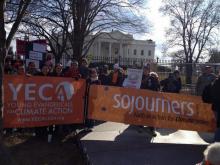
People of faith are in the 'miracle business.'
An estimated 200 people of faith gathered in Washington, D.C., on Sunday morning in preparation for the Forward on Climate Rally on the National Mall. The brief prayer service preceded the larger rally of an estimated 40,000 people urging President Barack Obama to take action against climate change and to reject the Keystone XL pipeline.
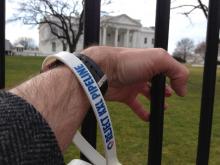
My wrist was cuffed to the White House fence next to the wrist of Robert F. Kennedy, Jr. Our nation’s chief climate scientist James Hanson stood next to me; Daryl Hannah sat in front of us. A few feet away, also cuffed to the fence, Julian Bond stood next to Bill McKibben and Michael Brune, Executive Director of the Sierra Club. Altogether, 48 of us from all over America obeyed our consciences. The days of safety and silence have ended. The time of pretending is over. Humanity will be held accountable for our desecration of creation. It is happening already.
And it was Ash Wednesday. When I mounted the platform to address the rally that preceded our civil disobedience, many were unaware that Lent was beginning. In the context of climate disruption, anyone who cares about creation can embrace the significance of Ash Wednesday. It’s a day of conscience, repentance, and conviction; a day when we take stock of our lives and our life together on the planet; a day when we confess our self-indulgent appetites, our intemperate love of worldly goods and comforts, and our obsession with consumption of every kind. For Christians, Ash Wednesday is a day to acknowledge that we are accountable to the God who gave us life and who entrusted the earth to our care.
Ash Wednesday is a good day to be arrested, I told the crowd. It’s a good day to realign our lives with God's desire to preserve this good creation. I invited any who wanted to receive ashes as a sign of their repentance to approach me on their way to White House.

In contrast to the ongoing public and political debate surrounding the legitimacy and urgency of climate change, the global scientific body of knowledge appears to be overwhelmingly clear, as highlighted in The Great Disruption by Paul Gilding:
"The consensus position on climate change is reflected in the rigorously peer-reviewed journals in which research is presented and issues are debated. One study by Naomi Oreskes, published in the journalScience, demonstrated that of the papers whose abstract contained the keywords global climate changebetween 1993 and 2003, none questioned the consensus position – not one. Oreskes’s subsequent book,Merchants of Doubt, revealed how many who once fronted the tobacco industry’s anti-science campaign to deny the link between smoking and lung cancer are also now prominent and vocal climate change skeptics, and they are often funded to create doubt that has no credible scientific basis."

I had a happy childhood, with few moments of true anguish. One that I will always remember, though, is when they cut down the tree on Euclid Street.
Throughout my early years, I would often take walks with my parents down this street, stopping to play on this tree’s bulging roots and hug its large trunk. On this particular weekday, my favorite tree had been replaced with a stump and some sawdust due to the risk of it falling over and taking out all the power lines its branches had engulfed. My four-year-old self was in shock.
I spent the afternoon wailing, to the dismay of my parents and the neighbor who came over for a play date. To this day, when I walk down Euclid Street and see pieces of the branches still hanging on to the power lines, I remember what it felt like to lose my first friend.

Use this Lenten season as a time to grow closer to God and simplify your life. Try a new suggestion from this list each day and experience the stronger relationships and calmer pace of an (almost) Amish lifestyle!
1. Start a giveaway box and add at least three items of clothes you have not worn in the last year.
2. Is there a form of technology that is ruling you like a master rather than serving you like a tool? Unplug for 24 hours and rediscover the peace that passes all understanding.
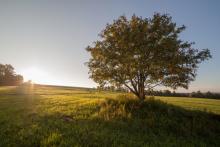
Lent is a time when we try to identify with our own weakness, so since we are about to start the Church’s penitent season, it was shocking to read Virgilio Elizondo’s account of how a people generally considered weak on the geopolitical stage – poor Mexicans and Chicanos – do not treat Ash Wednesday as a day of penitence at all.
“For the masses of the people, it has little to do with the beginning of Lent. Lent as a season of self-sacrifice is not really of special interest to the people: the entire year is a time of suffering and abnegation. On Ash Wednesday Mexican-Americans renew their cultic communion with mother earth. For them the earth has always been sacred and they retain a fundamental identity with it. The earth supports and regenerates life; itis life.”
What a beautiful and unexpected connection!
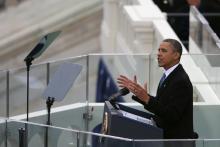
"Lincoln’s writings speak to me ... that though we may have our differences, we are one people, and we are one nation, united by a common creed. ... Lincoln saw beyond the bloodshed and division. He saw us not only as we were, but as we might be." - President Barack Obama
"We are confronted with the fierce urgency of now. …Over the bleached bones and jumbled residue of numerous civilizations are written the pathetic words: 'Too late.'" -Martin Luther King, Jr.
Dear President Obama,
Your words above aptly describe the greatness of Abraham Lincoln. Slavery was the moral crisis of his time, and because he fervently believed "we are one people," he took a stance which initially led to much adversity. But he rose to the challenge and the rest is history.
In a speech to Congress in 1862, Lincoln said: "The dogmas of the quiet past are inadequate to the stormy present. The occasion is piled high with difficulty and we must rise with the occasion. As our case is new, so we must think anew and act anew."
Circumstances have conspired to place you at the presidential helm during a moment of unprecedented global crisis. Last year, we saw one of the most prominent features of our planet — as seen from space — altered beyond recognition. A huge portion of the snow and ice white of the Arctic was simply, and stunningly, gone.
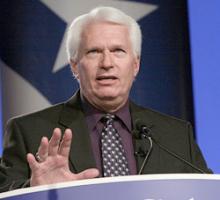
DIVINING GOD'S intent is incredibly easy—all you have to do is seek out his representatives here on earth, like Bryan Fischer, director of "issue analysis" for the American Family Association, "where he provides expertise on a range of public policy issues."
Indeed, Rev. Fischer speaks for the Lord on any number of topics (badness of gay people getting married, badness of Barack Obama who nurtures a "hatred of the white man," badness pretty much of anything that's changed since Fischer was born in 1951). But in the autumn, he offered the authoritative assurance that there was one thing God thought was really, really good: fossil fuel.
Fischer said that not using all the coal and gas and oil we could find was an affront to God—it would hurt God's feelings. In fact, he offered an analogy: Once "I opened up a birthday present that I didn't like, and I said it right out, 'Oh, I don't like those,'" he explained. "And the person that gave me the gift was there. And it just crushed that person. And you think, that's kind of how we're treating God when he's given us these gifts of abundant and inexpensive and effective fuel sources," Fischer added. "And we don't thank him for it and we don't use it. ... You know, God has buried those treasures there because he loves to see us find them."
That's really top-notch theology, as other similar top-notch theologians would attest. Dr. Calvin Beisner, for instance, is a founder of the Cornwall Alliance, the premier faith-based climate-change-denial operation on the planet. Sharing the microphone with Rev. Fischer, Rev. Beisner pointed out that not burning fossil fuel is really "an insult to God"—and that Jesus, too, wants us burning coal. If we didn't take advantage of all the flammable rocks on the planet, Beisner said, we would be like the "wicked and lazy steward" who was given talents by his master but simply buried them.

A RECENT RETREAT of evangelical environmentalists raised this theological question: Should we have expected most people in the developed world to hear the scientific evidence proving the great dangers of climate change and then decide to quickly change themselves—their view of the world, their lifestyles and politics—and to withdraw their support from the fossil fuel economy that is threatening the planet and its people?
Those of us gathered at the retreat didn't think so. We human beings just aren't that smart, wise, good, or unselfish. It's more human to deny the evidence, attack the messengers, delay the response, and just hope everything works out. That's what many have done. And since our political system is even more dysfunctional than most of the people it represents—and is bought and paid for by the gas and oil interests that control the economy—the chances are low for courageous and far-sighted leadership.
So what kind of wake-up call will it take to reduce the carbon emissions we humans create, which are warming the earth's temperature and endangering our future in increasingly dramatic ways? Perhaps it will take disruption and devastation—which is becoming the "new normal." So-called once-in-a-lifetime storms are now becoming frequent, with Superstorm Sandy only the most recent example.
Sandy seemed to get people's attention in a way we haven't seen since the 2010 BP oil spill in the Gulf. It came in a year when the lower 48 states suffered the warmest temperatures and most disruptive weather patterns since such records have been kept. We're already spending billions in emergency aid for the victims of hurricanes and weather disasters; those numbers will only increase. In addition to Sandy, we had 10 other billion-dollar weather disasters in 2012, including Hurricane Isaac and terrible tornadoes across the Midwest and Great Plains.
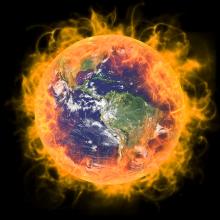
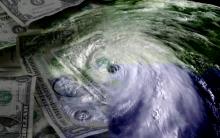
“We can’t wait any longer,” Sen. Chuck Schumer declared to his colleagues on Monday. “Ninety-one days ago, Sandy struck a body blow against New York. Today, finally, we can strike back and give our people the help they need to get back on their feet.”
Shortly following, the U.S. Senate passed a long-awaited $50.5-billion disaster aid package that was then sent to the White House for President Obama’s signature.
Superstorm Sandy was the largest Atlantic hurricane on record, though it was only ever a Category 2 storm at its strongest and had weakened to a Category 1 storm by landfall. Nevertheless, due to its immense size, incredible amount of moisture, and record-breaking storm surge, it is estimated to be the second costliest storm in the history of the United States after Hurricane Katrina in 2005.
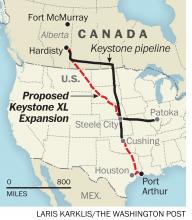
“If we fully develop the tar sands, we will certainly lose control of the climate. We will get to a point where we can not walk back from the cliff,” says climate scientist Dr. John Abraham. The Keystone XL pipeline is the lynchpin to developing the tar sands in Alberta.
I’ve been paying attention to the Keystone pipeline development since 2011 when it was under review by the State Department. I joined a group of religious leaders to deliver thousands of petitions to Dr. Kerri-Ann Jones, Assistant Secretary of State for Oceans and International Environmental and Scientific Affairs, asking her to to stop the pipeline. I said to her, “If this decision about the pipeline was made purely based on the climate science, we wouldn’t be here having this discussion.” She didn’t disagree. The exploitation of tar sands will significantly worsen the climate.
Now, new scientific data shows that developing the tar sands (and the pipeline to carry it) is worse than previously known. The video above shows climate scientists countering the notion that the climate impacts of the Keystone XL pipeline are small compared to total U.S. global greenhouse gas emissions. Nathan Lemphers, a Senior Policy Analyst with the Pembina Institute, details how the Keystone XL is a critical ingredient to significant expansion of tar sands. He dispels the myth being promoted by the tar sands oil industry that tar sands development is inevitable with our without Keystone XL. That’s not true. All other routes are similarly being blocked.

President Barack Obama’s Inauguration Address this week included a bold statement about his vision for addressing climate change. In fact, he redefined the issue of environmental protection as not only morally important but a command from God. After the vacuum of discussion of climate change during the presidential campaign, this proclamation came as a welcome surprise.
Most analyses of Obama’s speech point to the fact that the reason he was able to say what he did is that American public opinion has solidified behind these ideas. Plenty of polls will tell you that the number of Americans who accept the reality of climate change has soared in recent years, perhaps partly due to the natural disasters the president mentioned.

This winter, fiction revealed truth about climate change.
As a teacher, I relish the escape provided by pleasure reading before I return to the classroom for the next semester at Warren Wilson College, where I teach environmental education.
In December, without reading reviews or making a list, I visited my independent bookstore, Malaprop’s and purchased two books: Barbara Kingsolver’s Flight Behavior (2012) and Lauren Groff’s Arcadia (2012). I’m a long-time Kingsolver fan and bought her book as a gift, with the goal of reading it before wrapping it. And the cover of Arcadia, with its teal VW bus and field of sunflowers, drew me into purchasing what I thought was my second random choice for recreational reading.
Both books, it turns out, integrated climate change into the plotline, weaving scientific truths about global warming into the lives of fictional characters. And just as compelling, both works of fiction featured spiritual community at the center of critical decisions about the future of the land and its inhabitants.
Of note, critics have bemoaned the lack of fiction centered on climate change, a paucity that seemed to mirror our public denial of this scientific reality. In a 2010 blog on openDemocracy, professor and author Andrew Dobson even outlined the components of a “climate-change novel” that include a grim future, characters who explore ethical choices around global warming, and (no surprise here) extreme weather events. He ended his piece with this challenge: “So there’s the recipe. Who’s going to write the book?”
One day after making climate change a key issue in his inaurugal address President Obama has decided to put off a decision on the Keystone XL Pipeline until April. The issue was thrust to the front of the agenda today when the governor of Nebraska approved the pipeline. The ultimate fate of the project is in Obama's hands. The Guardian reports:
Republicans immediately pushed Obama to approve the pipeline. "There is no bureaucratic excuse, hurdle or catch President Obama can use to delay this project any further," John Boehner, the Republican speaker of the House of Representatives, said in a statement. "He and he alone stands in the way of tens of thousands of new jobs and energy security."
Campaigners against the pipeline said Obama should immediately shut down the project. "Approving Keystone XL would make a mockery of the commitment he made at the inauguration to take action on climate change," said 350.org, which has led opposition to the pipeline.
A rare winter fire in Colorado's Rocky Mountains is fueling fears the 2013 wildfire season will be longer and more intense. Unusually high temperatures and wide spread droughts have contributed to the increase in wildfires. USA Today reports:
"The wildfire season's length and intensity is driven largely by how much snow and rain falls each winter and spring. Heavy, wet snows tend to delay the season by keeping the ground, grasses and trees wet. Even the weight of snow plays a factor in some fires: Tall grasses that haven't been squashed down like normal carry fires faster and hotter.
Put another way: It hasn't snowed or rained much and forecasters say it doesn't look likely to get any better."